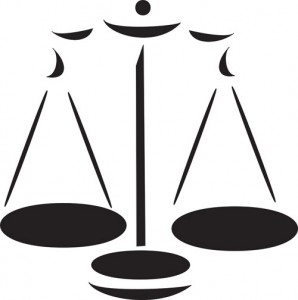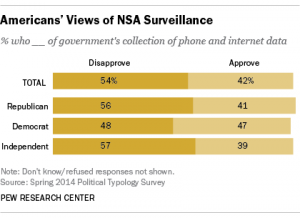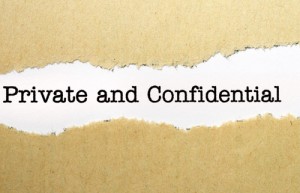NSA Surveillance and Online Privacy
Who are the NSA?
The National Security Agency (NSA) is a powerful United States intelligence organization. Basically, they are responsible for collecting, processing, and monitoring global data for intelligence purposes. The NSA has a stated role to advance national security while protecting the freedoms, civil liberties, and privacy rights guaranteed by the Constitution and federal law.
What is the issue?
Many studies, cases, and documents show that the US government is spying on American citizens using online NSA surveillance. As Americans, this invades our Freedom of Speech and our Right to Privacy. The ACLU has called this activity “unconstitutional surveillance of Americans’ communications”.
Some Examples
An internal NSA audit from 2012 revealed they committed 2,776 incidents of unauthorized surveillance of Americans or foreign targets in the US over a one-year period.

On May 20, 2013, Edward Snowden released files from the NSA which described, as he put it, “systematic surveillance of innocent citizens.” Based on Snowden’s documents, the NSA has at least nine major tech companies gathering data on selected surveillance targets. This revelation caused online privacy concerns to increase dramatically in the US.
Then on Dec 24, 2014, a Freedom of Information lawsuit filed by the ACLU revealed NSA documents from 2001 to 2013. Overall, these documents showed that there were instances of unauthorized surveillance of US organizations, spouses or love interests, and more American citizens.
What is a Digital Pat Down?
The inner workings of an intelligence machine like the NSA can be difficult to grasp. From leaked documents so far, we can surmise that the NSA is performing secret “digital pat downs” on American citizens somewhat regularly. This happens without our knowledge or consent.
First, an NSA analyst identifies a target and submits a request to the FBI’s Data Intercept Technology Unit. Next, dedicated employees at various tech companies receive the request and gather the requisite data. This may include emails, chat logs, and videos. Once the data is compiled, it is sent back to the FBI for analysis.
The National Security Agency is also piggybacking on the tools that enable Internet advertisers to track consumers, using “cookies” and location data to pinpoint targets for government hacking and to bolster surveillance. We’ve talked in detail about mobile phone tracking tools previously.
They are also collecting location data transmitted by mobile apps. An NSA program, code-named HAPPYFOOT, helps the NSA to map Internet addresses to physical locations more precisely than is possible with traditional Internet geolocation services.
 How do Americans feel?
How do Americans feel?
PEW research shows what Americans think about online privacy and the NSA.
Overall, 54% of Americans disapprove of the US Government collecting telephone and Internet data for anti-terrorism efforts.
74% said they should not give up their privacy and freedom for the sake of safety.
93% think it is important to control who can get their information.
38% think they have only some control over their own information.
Cyber Legislation
CISPA had alarmed the privacy community by giving companies the ability to share cyber security information with federal agencies, including the NSA, “notwithstanding any other provision of law.” That means CISPA’s information-sharing channel, created for responding quickly to hacks and breaches, could also provide a loophole in privacy laws that would enable warrant-less intelligence and surveillance. The information they gather, including all hacked data and any incidental information swept up in the process, would be added to a massive database. The FBI, CIA, and NSA would then be free to query this data at their leisure.
This is how CISPA would create a huge expansion of the “backdoor” search capabilities that the government uses to skirt the 4th Amendment and spy on Internet users without warrants and with virtually no oversight.
How to prevent being spied on by the NSA and other data collectors without going off the grid
It may be impossible to completely prevent the NSA from spying on you, but you can try and make it much harder.
- Avoid popular Online Consumer services – These include Google, Facebook, and DropBox.
- An alternative to DropBox is SpiderOak.
- A common alternatives to Google is DuckDuckGo.
- Mashable has published a list of private social networks to help you avoid the Facebook plague.
 Encrypt your hard drive – You may have password protection on your files but you should go a whole step further and encrypt the entire hard drive.
Encrypt your hard drive – You may have password protection on your files but you should go a whole step further and encrypt the entire hard drive.
- Avoid online tracking – On you browser you can use the do-not-track setting but you can go a step farther and use a plugin to stop tracking. Some reputable plugins for this include:
- Encrypt your email and chat messages – Encrypt your messages before you send them. Some common email clients with encryption include:
- Microsoft Outlook – This has encyption options if you want to use them.
- Runbox (a Norwegian secure email client) – Claims to be unreachable by the NSA.
- HushMail – Not as popular but is completely encypted.
If you chat on the Internet, you can encypt those messages too.
- ChatCrypt – Encrypts the message when it sends and can only be read by the end user, also known as end-to-end encryption.
If you use common instant messaging through Google, AOL, Yahoo or Microsoft you can use a chat extension called OTR (Off the record) which enables end-to-end encryption.
- Use TOR for online browsing – TOR stands for The Onion Router. Like an onion, it layers multiple levels of security. Basically, it bounces communication around a network of relays which makes it very difficult to track.
 Many browsers also have a private mode.
Many browsers also have a private mode.
- Firefox – Private Browsing
- Chrome – Incognito mode
- Internet Explorer – InPrivate feature
Online Privacy in Europe
A recent draft of the British Investigatory Powers Bill will require companies to store information for up to a year. Communications companies would hold details of which websites and apps a person uses.
 Recently, the European Union has decided to invalidate the current voluntary safe harbor because they believe the US cannot adequately protect its privacy. There have been reports that European companies are transferring data out of US territory for safe keeping.
Recently, the European Union has decided to invalidate the current voluntary safe harbor because they believe the US cannot adequately protect its privacy. There have been reports that European companies are transferring data out of US territory for safe keeping.
EU-US Privacy Shield
The US Government released full text of the new European Union-US Privacy Shield on Feb 29. This is not yet law.
Citizen complaints – The new agreement gives companies and citizens the chance to complain and dispute any mishandling of records and personal information.
Targeted spying – This will now be limited to: detect and counter threats from espionage, terrorism, weapons of mass destruction, threats to the armed forces, or transnational criminal threats.
The proposed framework includes the following features:
- Companies must provide greater transparency with respect to their data collection, use, and sharing practices through more robust and detailed privacy policies
- If a company handles human resource (employee) data, it must agree to cooperate and comply with EU Data Protection Authorities (DPAs)
- Companies transferring personal data to third-party service providers remain fully responsible for the proper handling of personal data; must conduct appropriate due diligence concerning its service provider; and must properly monitor and re-mediate any deficiencies of its service providers relating to the handling of personal data
Our Advice
Ideally, companies should give consumers control over the information they divulge. This becomes even more urgent since corporations so freely share information with government authorities. Until consumers begin reading those 30-page privacy policies rather than blindly accepting them, they will continue falling for the same traps. Generally, as consumers we must understand that the “free” services we consume are actually very expensive. It often comes at the price of our privacy. So take a long hard look at the next privacy policy you’re asked to accept. You may be better served just paying cash instead.
Do Not Track
In 2010, the Federal Trade Commission (FTC) had pledged to give Internet users the power to decide if or when websites were allowed to track their behavior called the ‘Do Not Track’ initiative.
This concept allowed a user to opt out of letting any of their online data to be tracked and found by anyone on the Internet. Similar to the ‘Do Not Call’ initiative of 2007, today we still do not see the ‘Do Not Track’ initiative doing what the FTC pledged it would.
Last Month, two members of congress filed a bill called the ‘Do Not Track Online Act of 2015’
This act would “require companies to allow consumers to stop collection of personal information”.
The ‘Do Not Track Act’ prevents privacy abuse and gives back control over personal lives online. People deserve to be empowered to stop trackers who collect and store their personal, private information.” – US Senator Richard Blumenthal
Every online click consumers make provides a detailed and private picture of their personal lives, and Americans should have control over the collection and use of this personal, sensitive information.” – US Senator Edward Markey
Where did the FTC go wrong?
Standard Never Finalized – 5 years later and the industry group have not finalized a standard for how ‘Do Not Track’ would work. Even those working with them to finalize this have given up their efforts.
Relied on Powerful Internet Companies – The FTC relied on powerful Internet companies such as Google, Facebook, and Yahoo. This presents a conflict of interest since these businesses want to track information for use in online advertising.
Unfair Set of Rules – Eventually, a team proposed a set of rules last August that let these powerful Internet companies track their consumers as long as they did not pass it along to any third parties. This caused those third party companies to feel they had an unfair competitive disadvantage.
Loss of Help – Companies such as The Digital Advertising Alliance, Consumer, Watchdog, The Electronic Frontier Foundation, and many more all gave up the efforts that the working group would come to a solution.
 Mobile Browser Tracking
Mobile Browser Tracking
Mobile phone carriers Verizon and AT&T are tracking your mobile online web activity. They do this by using “Supercookies” which collect information on your browsing habits. These cookies, unlike ordinary cookies, cannot be deleted by clearing your browsing history. This feature also ignores any ‘Do Not Track’ settings. Using a private browser does not help with this type of cookie.
Verizon Users
Since 2012, Verizon gives this tracked information to marketing companies that send out targeted advertisements based on your browsing habits. Verizon uses a process called X-UDIH to collect this data. The Electronic Frontier Foundation has become concerned about “what this technology allows others to find out about users’ web activity,” because of how insecure and dangerous for privacy it is.
AT&T Users
Similar to Verizon, the information AT&T collects is visible to third parties for targeted ads but they are testing a new way to track customers. They claim to be working on a privacy-protective measure on their tracking.
What Kind of Information is Collected
 Web browsers collect 2 different types of cookies. First-Party cookies and Third-Party cookies.
Web browsers collect 2 different types of cookies. First-Party cookies and Third-Party cookies.
First-Party cookies include:
- Shopping cart items ie. amazon.com
- Log-in name
- Language
- Location
- Preferences/settings
ie. saved places on weather.com - High games scores
Third-Party cookies include:
- Browsing History
- Searches through search Engines
ie. Google.com - Search result from other sites
ie. Amazon.com
Browser cookies can also store your name, home address, and telephone number, but only if you provide it.
Third parties can track social media information such as your name, friend list, and even more.
How to Block Tracking
Browser Tracking Blockers – Chrome and Firefox
- Adblock Plus
- Ghostery
- Do Not Track Plus
- ScriptNo (Chrome)
- NoScript (Firefox)
 Mobile Browser
Mobile Browser
Tracking Blockers and Tips
- Set browser setting to “Privacy Mode”
- Use apps instead of the web
- Dolphin Browser (Android)
Visit our online privacy article to learn more on ways to prevent data collection and online spying





